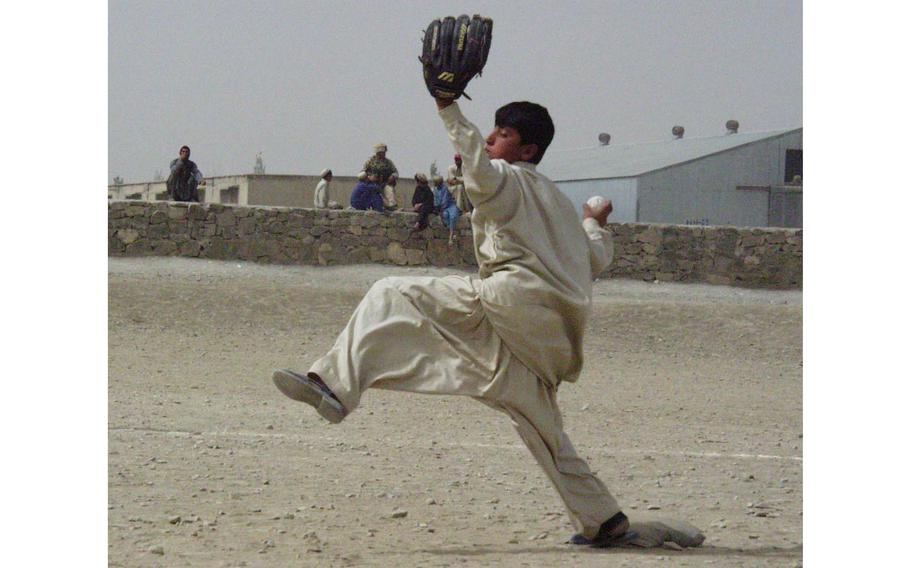
Nasib, 14, fires a pitch during the fourth inning in Orgun-e, Afghanistan. U.S. soldiers have put together two baseball teams with local boys, holding games each Friday. (Scott Schonauer/Stars and Stripes)
This article first appeared in the Stars and Stripes Europe edition, Aug. 18, 2002. It is republished unedited in its original form.
ORGUN-E, Afghanistan — The ballfield is dirt and rock; a crippled tank sits just beyond centerfield.
Sandbags are the bases and outfield chatter is in Pashtu. The scorekeeper in left field carries an AK-47 rifle.
Peanuts and Cracker Jack are not for sale, but in between innings “Take Me Out to the Ballgame” blares from a U.S. Army Humvee.
Afghanistan is a bizarre place to find a sport known as America’s pastime, but in the village of Orgun-e, baseball has become a weekly tradition.
Coached and organized by a group of U.S. Army soldiers, two teams of Afghan boys, ages 12 to 17, play baseball every Friday in front of a growing crowd of villagers.
In just a few weeks, soldiers say the boys have picked up the basics of the game amazingly quick.
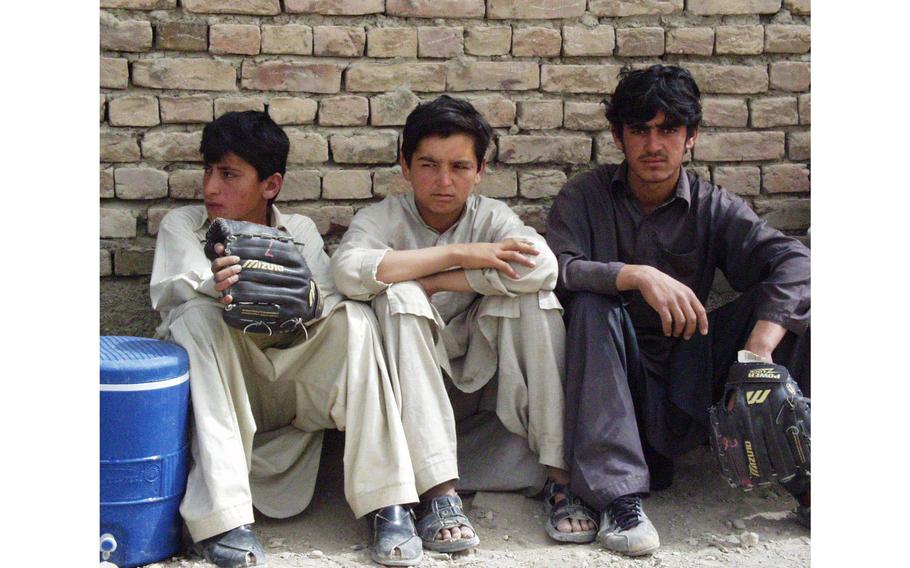
Three Afghan boys rest between innings of a baseball game in Orgun-e, Afghanistan. U.S. soldiers have put together two baseball teams with local boys, holding games each Friday. (Scott Schonauer/Stars and Stripes)
“I’ll tell you what,” said Cpl. Peter Sarvis, a soldier with the Fort Campbell, Ky.-based 102nd Quartermasters. “They pick up this game faster than the kids in the States.”
Army civil affairs officers based at a nearby camp helped form Afghanistan’s only two baseball teams — the Afghan Club and the Eagles.
While professional baseball players and owners squabble over money, and Little Leagues struggle with overzealous coaches and parents, Friday’s game between the teams was stripped of greed and bad sportsmanship.
The Afghan boys played just for fun.
“These kids love it,” Sarvis said.
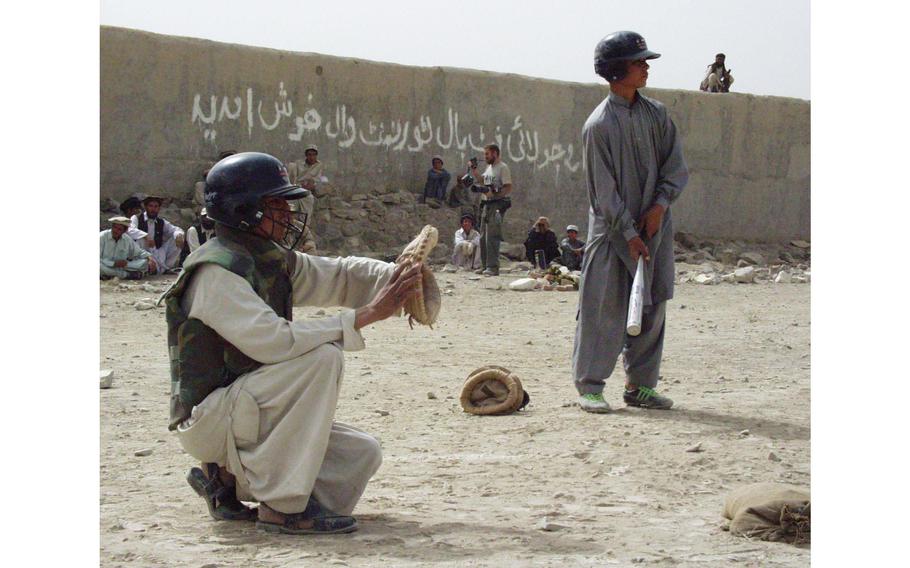
An Afghan boy takes some practice pitches before another boy steps up to home plate for his at-bat in Orgun-e, Afghanistan. (Scott Schonauer/Stars and Stripes)
The league started about a month ago, when the wife of a Sgt. 1st Class Jay Smith sent a couple of baseballs and two gloves. The son and nephew of an Aghan cook at the Orgun-e base camp became interested in playing, and, soon after, soldiers got the idea of taking the sport out into town to see if other children would be interested.
In a matter of days, soldiers found enough willing participants to put together two teams. Now, coaches for both clubs have a roster full of starters and reserves.
“It grows every week,” said Sgt. 1st Class Henry Koenig, a member of the Fort Bragg, N.C.-based 90th Civil Affairs Battalion.
While the boys have the enthusiasm, they lack some of the proper equipment. Soldiers have been creative.
Catchers wear a flak vest for chest protection. Additional vests are used as a backstop. Sandbags mark all the bases and the pitcher’s mound. Church groups and relatives of the soldiers have donated a catcher’s mask, more balls and two aluminum bats.
Many of the players play barefoot, but they have brand new Mizuno and Rawlings leather gloves donated by friends in the United States.
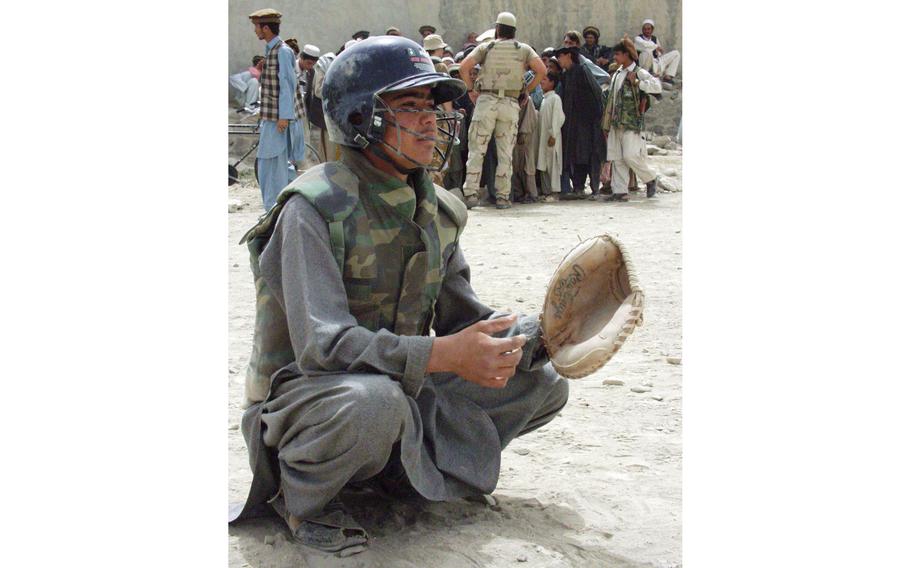
An Afghan boy, wearing a flak vest for protection, gets ready to take a few practice pitches during a baseball game in Orgun-e, Afghanistan. (Scott Schonauer/Stars and Stripes)
On Tuesdays and Thursdays, soldiers hold practice to teach the children baseball basics. Although soccer and volleyball were the two biggest sports in Afghanistan before the Taliban banned them, the influence of cricket has helped the boys adjust to baseball.
But the lack of exposure to the game has presented some interesting lessons. For example, instead of tagging out a runner, some players threw the ball at them.
“And it took two or three days to teach them not to carry the bat around the bases,” Sarvis said.
Muhammad Hanif, 14, a member of the Afghan Club, said overcoming the fear of getting hit with the baseball was difficult.
“The ball is very hard,” he said.
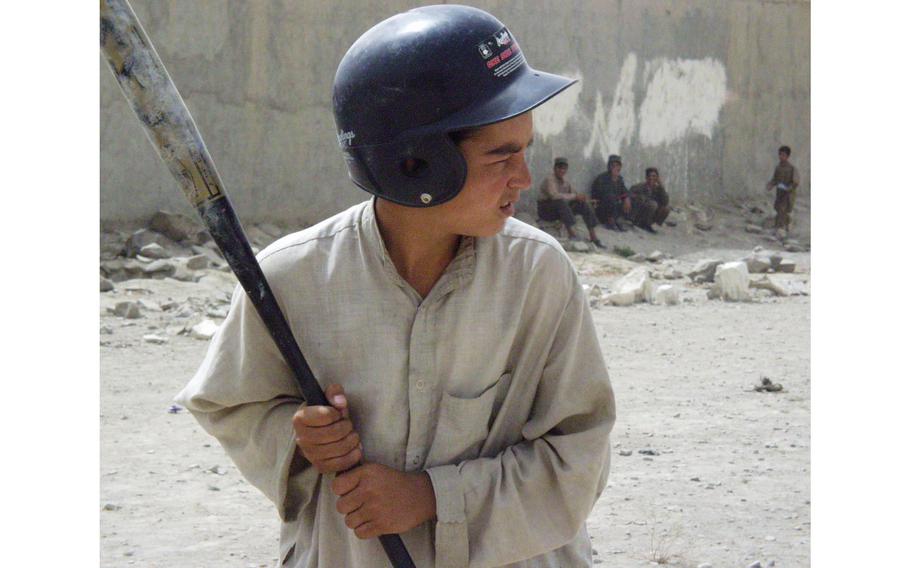
Abdul Haq gets ready for the pitch during a baseball game in Orgun-e, Afghanistan. (Scott Schonauer/Stars and Stripes)
Baseball fever has spread throughout the small village.
Most spectators know little about the rules of the game, but that didn’t stop 200 people from lining the field to watch. One man gave out green tea in a kettle painted like a baseball.
Adam Khan Masoodi, 40, doesn’t know the difference between a home run and a double play, but he finds baseball fascinating.
“It’s interesting for us,” he said. “All of the Afghans like it because it’s a new game. This is a gift from the Americans to us.”
Although only boys play on the two teams, soldiers are trying to get a girls team together. Soldiers said the baseball games have created a bond with the local children and teens, a group of the populace that the U.S. military is focused on influencing in Afghanistan.
They want to convince younger Afghans that the military, which is in Afghanistan to root out any remnants of the Taliban and al-Qaida, is here to help.
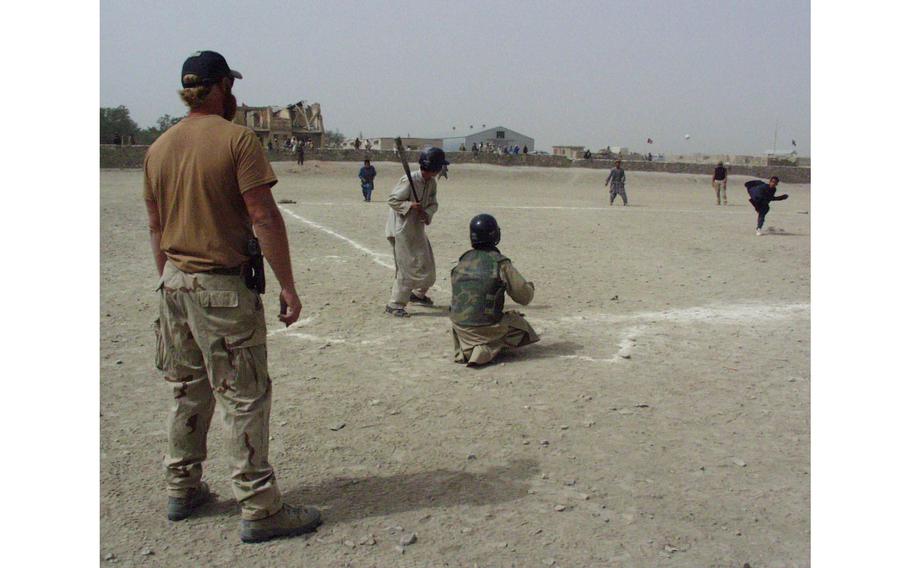
Sgt 1st Class Casey Grau, left, umpires an Afghan baseball game Aug. 16, 2002, in Orgun-e, Afghanistan. U.S. soldiers have put together two baseball teams with local boys, holding games each Friday. (Scott Schonauer/Stars and Stripes)
“It’s to show them the American way,” Koenig said. “We’re here for no other reason but to help out.”
It has already made a good impression on several of the players, who say they like interacting with the soldiers and practicing their English.
Nazim, 14, who goes only by one name, has grown to love baseball. But his father would rather he stay and work at the family’s vegetable shop. He had to trick his father to play Friday’s game.
“My father is unhappy that I’m playing baseball,” said Nazim, who knocked in two runs to lead the Eagles to their first win, a 6-1 victory. “When my father told me not to go play baseball, I told him, ‘I’m going to school.’ ”
Nazim’s father, Shabaran, 40, fought against the Soviets in the 1980s and lost part of his right foot to a land mine. But Nazim said he doesn’t want to follow in his father’s footsteps and become a holy warrior. He just wants to play ball.
“I’d like to be a player, not a fighter,” he said.